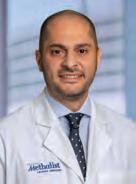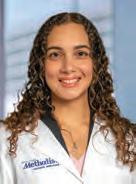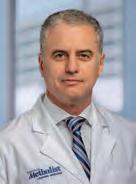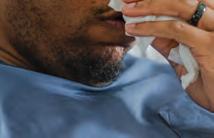LEADING MEDICINE
Understanding
KNOW YOUR NUMBERS:
How Your Doctor Can Help You Stay in a Healthy Range
Find Relief From Migraines


Understanding
How Your Doctor Can Help You Stay in a Healthy Range
Find Relief From Migraines

Colon cancer. Rectal cancer. Colorectal cancer. What are the differences?
Colon cancer and rectal cancer are two different types of colorectal cancer based on the location of the cancer. They share many similarities, including symptoms, risk factors and even some of the basic biology as to how these cancers develop. They're also screened for in a similar way. However, there are differences between these two cancers, particularly when it comes to how they're treated.
While there are many similarities between colon and rectal cancers, the two individual cancers are not the same.
“ The major difference between colon and rectal cancer is how they're treated,” said Dr. Tareq Kamal, a colorectal surgeon at Houston Methodist West Hospital. “Treatment will also vary depending on the stage of either type of cancer.”

Colon cancer treatment typically starts with surgery. It may or may not be followed by chemotherapy depending on the final stage of the cancer.

Rectal cancer treatment, on the other hand, often begins with either chemotherapy or radiation (or a combination of the two) before surgery. After surgery, more chemotherapy may be needed as well.
But even with these treatment differences, screening is vital for catching both types of cancer.
“Most colorectal cancers begin as polyps, so following the recommended screening guidelines is critical for detecting both colon and rectal cancer,” Kamal explained. “While there are various screening options, a colonoscopy is the most common and effective tool for early diagnosis.”
E arly detection of colorectal cancer is so important. It can often mean less aggressive treatment as well as a significantly better chance of survival. For most people, colorectal cancer screening begins at age 45.
S creening should begin much earlier if you had an immediate family member with colorectal cancer. In this case, experts recommend starting screening as early as 10 years before the age at which a family member was diagnosed. •
Following the screening guidelines remains the best way to diagnose colon or rectal cancer in the early stages when it’s highly treatable. Talk to your doctor about when you should be screened and how often. Schedule your colonoscopy today by visiting houstonmethodist.org/ gastroenterology/colonoscopy or calling 832.522.5522.
Contrary to what you might think, stretching isn't just for athletes. It's important for everyone to incorporate stretching into their daily routine.
“Stretching is an essential activity, especially as you age,” said Dr. Sarah Abdellatif, a board-certified primary care sports medicine physician at Houston Methodist Orthopedics & Sports Medicine at West Hospital. “It helps maintain flexibility and mobility in your joints and muscles, improves posture, and helps reduce stress and body aches.”
Stretching may seem straightforward, but there are definitely right ways and wrong ways to stretch. Take note of these stretching tips to avoid injury and get the most benefit:

The most important muscles for everyone to stretch regularly are the ones used most for balance and mobility, including arms, legs, hips, neck and back.
DO hold stretches for at least 30 seconds
A common mistake is not holding a stretch long enough. Aim to hold each stretch between 30-60 seconds to see the most benefit.
Stretching after exercise has multiple benefits. “After your workout, stretch the muscles you were using during the exercise,” Abdellatif said. “This will reduce blood flow and help decrease muscle soreness.”
It’s important to do a warm-up activity before you start stretching. “Before you stretch, do a light jog, jumping jacks, or maybe some high knees to warm up your body,” Abdellatif suggested. “This will help loosen stiff muscles and prevent injuries.”
While you may feel some discomfort while stretching, you should absolutely not feel pain. The pull on your muscles should be gentle, not sharp. If you feel pain, you should stop immediately to avoid injury. Consult with your doctor if the pain continues.
Bouncing while stretching can do more harm than good. “Bouncing not only can contribute to muscle tightness, but you also could potentially pull a muscle,” Abdellatif explained. “So, it’s best to just stretch in a gradual, smooth movement.”
Stretching an injury could prolong the healing process. When the time is right, your doctor will work with you to slowly start reintroducing low-intensity stretching. •
When injuries can’t wait, visit the walk-in Houston Methodist Orthopedic Injury Clinic at West Hospital — no appointment needed. Our experts will quickly evaluate and treat your injury. The clinic provides same-day treatment for:
■ Fractures and broken bones
■ Injured tendons
■ Minor dislocations
■ Sports injuries
■ Sprains and strains
■ Torn ligaments Visit houstonmethodist.org/osm-injury-west or call 832.522.8280 for details.
Chronic conditions, back or spine injuries, motor vehicle accidents, and workers’ compensation injuries are not treated at the injury clinic. Call 832.522.8280 to schedule an appointment with the appropriate physician for those conditions.
Our sports medicine team includes orthopedic surgeons, physical therapists, primary care sports medicine doctors and athletic trainers working together to create a personalized treatment plan for you. Visit houstonmethodist.org/orthopedics-west or call us at 832.522.8280 for help finding a sports medicine specialist.

Your primary care provider, or PCP, is one of your most important health resources. But what does a PCP do?
“As a PCP, I’m your health partner and coach,” explained Dr. Knic Rabara, a primary care physician with Houston Methodist Primary Care Group at West Hospital. “I can help diagnose your health problems, prevent future challenges and work with you to understand the best ways to support your ongoing good health.”

Your PCP performs annual check-ups and is usually the first stop if any illness or health concerns arise. They help you understand and reduce your risk for developing a wide variety of health problems. PCPs monitor your health and can recommend testing or refer you to specialty care when needed. Together, you and your PCP can help you continue to live the life you love.
“Seeing your doctor is the first step toward feeling better and healthier,” Rabara said. “Just like changing the oil in your car, working with your PCP can help make sure you stay in top condition.”
For a helpful next visit, be prepared to talk with your doctor about these important indicators.

Heart disease is the leading cause of death in both men and women in the U.S. By understanding your numbers, you can reduce your risk of developing cardiovascular disease as well as other health conditions, such as stroke, diabetes and obesity.
■ Blood Pressure: A measurement of the amount of force your heart needs to pump blood throughout your body. Blood pressure is measured by two numbers: systolic (when your heart pumps blood out) and diastolic (when your heart rests between beats).
✓ Healthy target: less than 120/80 mmHg
Risks: High blood pressure can negatively affect the function of your heart and other major organs, such as the kidney and brain. It’s also the leading cause of stroke and cardiovascular disease.
■ Body Mass Index (BMI): A measure of your weight divided by your height, squared.
✓ Healthy BMI target: 18.5 to 25 kg/m2
Risks: The higher your BMI, the greater your risk of heart disease, high blood pressure, type 2 diabetes, metabolic syndrome and certain cancers.
■ Fasting Blood Sugar (FBS): A measure of the amount of glucose in your blood after fasting for eight to 12 hours.
✓ Healthy FBS target: below 100 mg/dL
Risks: Also called hyperglycemia, high blood sugar can damage the blood vessels and nerves that control your heart over time. It can also lead to type 2 diabetes.
■ Total Cholesterol: A measurement of cholesterol (a fat-like substance made in the liver and found in foods) in your blood.
✓ Healthy target: less than 200 mg/dL. Talk to your doctor to understand all of your cholesterol (lipid) levels, including LDL, HDL and triglycerides, and what they mean for your heart health.
Chances are you may have seen a nurse practitioner (NP) or physician assistant (PA) during a doctor’s office visit sometime in your lifetime. While they are not medical doctors, these highly trained health care providers work hand in hand with physicians as part of your health care team.
These providers have the expertise to diagnose and treat patients in a variety of specialties. They undergo years of medical training — in fact, most have a master’s degree or a doctorate. Working under the supervision of your doctor, PAs and NPs perform clinical exams, diagnose and treat illnesses, order labs and tests, and prescribe medications. Houston Methodist is home to dozens of such providers, who provide expert, compassionate care throughout the system.
Houston Methodist provides primary care that’s personalized for you and your unique needs. To find a primary care provider near you or make an appointment, visit houstonmethodist.org/pcg/west or call 713.441.7965.
Risks: Excess cholesterol can build up in the walls of the arteries, leading to narrowing or blockages in your vessels, which increases your risk of heart attack or stroke.
Some risk factors are genetic or out of your control, like family history, age and sex — but there’s still a lot you can do to keep your numbers in a healthy range such as a healthy diet, exercise, weight loss and sometimes medications.
The best way to know your numbers and understand how they impact your health is to visit your PCP. As your health partner, they can perform or order tests to check these important measurements and help you make a personalized plan to get back within healthy range if necessary. Plans can include increasing your activity level, adopting healthy eating habits, quitting smoking, limiting alcohol and learning how to check and manage your blood pressure.
Building a partnership with your PCP and working with them to know and manage your numbers can dramatically reduce your risk of heart disease and other health complications. •
For these key measurements, keeping your results within these healthy ranges will go a long way toward maintaining your best heart health.
Blood Pressure: Less than 120/80 mmHg
Body Mass Index: 18.5 to 25 kg/m2
Fasting Blood Sugar: 80 to 99 mg/dL
Total Cholesterol: Less than 200 mg/dL
Talk with your primary care provider about these important tests and steps you can take to get back in a healthy range. If you have diabetes or other health conditions, your goal numbers may vary.
When a migraine attack sets in, finding relief is your top priority.
Migraines are more than just your typical headache; they can cause debilitating pain and other symptoms that prevent you from participating in daily activities. A migraine headache may trigger throbbing pain on one or both sides of your head, leaving you nauseated, vomiting, or sensitive to light and sound.
Migraines don’t have to rule your life. Partner with your doctor to find the right treatment for you. “ There are new and effective treatments available to people who suffer from chronic migraines,” said Dr. Vindhya Koneru, neurologist at Houston Methodist West Hospital. “Not only can these promising treatments help relieve migraine symptoms, but also prevent future attacks.”

Depending on your symptoms and medical history, a combination of the following treatments may be helpful: Prescription medications. These medications are for people who suffer frequent, severe headaches that don’t respond well to home remedies or over-the-counter treatment. They aim to reduce how often you get a migraine, the severity, and how long they last.
Monoclonal antibodies. Newer drugs, called calcitonin generelated peptide (CGRP) monoclonal antibodies, may be given by injection at home or intravenous (IV) infusion. This type of treatment given every one to three months may help manage severe cases of chronic headaches and migraines.
BOTOX® injections. The same BOTOX®, or botulinum toxin type A, used by plastic surgeons to treat facial wrinkles, is also used to relieve chronic migraines. BOTOX® is injected about every 12 weeks and helps prevent muscle tension that can trigger migraines and blocks the nerves that signal pain. Integrative medicine. “Medication is a proven way to treat and prevent migraines, but it's not the only measure you can take,” Koneru said. “There are nontraditional therapies that can be just as effective to help relieve pain and prevent future migraine episodes.”
Your doctor may encourage you to try the following as part of your treatment plan:
■ Lifestyle changes
■ Relaxation techniques, such as biofeedback, meditation and yoga.
■ Cognitive behavioral therapy (talk therapy), which can help you understand how thoughts and behaviors may affect your response to pain.
■ Acupuncture •
If you’re suffering from severe or chronic migraines, the neurologists at Houston Methodist West Hospital can provide an evaluation and help you find relief. Call 832.522.8520 to schedule your appointment today.

For many people, the holidays are a wonderful time of reconnecting with family and celebrating life’s pleasures. As the holiday season ends, many focus on improving their health in the new year through weight loss and exercise.

“People need to understand that losing weight is really difficult,” said Dr. Garth Davis, a bariatric surgeon at Houston Methodist Center for Weight Loss & Bariatric Surgery at West Hospital. “Very little of obesity is willpower. It is genetically hardwired from a time when our ancestors faced starvation every day.”

With that in mind, Davis offered tips for getting healthy after the holidays.
To change unhealthy habits, Davis recommends taking a cognitive behavioral therapy (CBT) approach. “The idea behind cognitive behavioral therapy is to help you become aware of your desires and thoughts before they turn into unhealthy actions,” he explained.
Bringing awareness to our “mindless” habits, especially when it comes to eating, can be the first step the changing them. Once you’ve identified and named the thoughts and patterns that drive you to eat unhealthy foods, make a plan to interrupt those patterns before they occur.
D avis suggested posting a list of “smart swaps,” on the fridge to remind yourself to reach for an apple instead of potato chips, for instance.
Getting healthy is about more than losing weight. In fact, said Davis, losing weight should be a beneficial side effect of becoming healthier. “Anybody can benefit from healthy lifestyle habits,” he said, “and if those habits lead to weight loss, that’s great.”
E xperts recommend getting 300 minutes of exercise per week, or 60 minutes per day for five days. Build a habit of both resistance training and zone 2 cardio, which is maintaining an elevated heart rate (180 minus your age) for about 45 minutes per session. Your exertion level should be low enough so you
can still hold a conversation. Walking, running, bicycling and swimming are great cardio exercises.
To help ensure you’re making progress, set SMART goals: specific, measurable, achievable, relevant and time bound. For example: briskly walk on a treadmill for 45 minutes, five days per week, for the next 30 days.
If your efforts to get healthy at home are unsuccessful, you may benefit from talking with an expert. Our weight loss specialists can help with lifestyle changes and recommend methods like medications and surgeries that could aid you in achieving your health goals. •
There’s a lot of bad information online, and fad diets can harm your health more than they help. To begin your healthy lifestyle, Dr. Garth Davis recommends the following:
■ Avoid processed foods.
■ Don’t count calories.
■ Eat more plant-based foods, like fruits, vegetables, beans and lentils.
■ Emphasize fiber in your diet instead of protein.
■ Make water your beverage of choice.
■ Remain active throughout the day.













